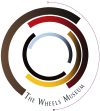In the Tank: A Job in the AT&SF Backshops
By Monika Ghattas
Excerpts from an oral interview with Jay Wyche, Oct. 1999
Today Jay Wyche is retired and lives with his wife on the east side of the Sandias-on a huge mesa somewhere between Galisteo and Stanley, New Mexico. There he built a home to enjoy the vast open spaces and the solitude he has preferred. He retired as head of Albuquerque Publishing Company’s printing office, but years before, he started his career working for the railroad.
Born and raised on a ranch in southern New Mexico, Wyche had little formal schooling, but he taught himself a number of practical skills that would serve him well in his later careers. First and foremost, he was an expert marksman and hunter. In addition, he learned a lot about tools and intricate machinery.
After he married, in the late 1930s, he needed a steady income, so he decided to move to Albuquerque and work as a taxidermist. A short time later came a lucky break. A group of visiting Santa Fe railroad officials heard of his hunting prowess and asked him to lead a trip for them. They were so pleased with his arrangements they offered him a job in the railroad’s backshops in Albuquerque.
For Wyche this was a wonderful opportunity-the taxidermy business was not doing well-and the railroad provided a lot more security than he had ever achieved when working as a ranch hand. So in the late 1930s, he started work in the backshops as a common laborer, assigned to do general maintenance, such as sweeping and cleaning. His starting salary was thirty- seven and a half cents an hour.
Wyche found himself increasingly working around the tender tanks that hauled water, oil and coal for steam locomotives. These had to be periodically scraped and cleaned on the inside, especially the ones used for oil. This was a very dirty and dangerous job, because he had to climb into the tanks and use various chemicals (along with a lot of elbow grease) to remove as much of the goop as possible.
These tanks always looked a lot bigger on they outside than they did on the inside, and small locomotive tenders could be very tight. Many of the men suffered from claustrophobia in these dank, smelly tanks and refused to do the job. But Wyche worked on the inside of many a tender tank. His wife remembers having to take his overalls to a special laundry nearby where certain washing machines were set aside for especially dirty clothes.
Later Wyche was promoted to a locomotive stripping gang. Locomotives were routinely disassembled and sandblasted to remove all the old paint and grease. Then the frames were inspected for hairline cracks and sent to the finishing shed. In the meantime, the boilers were scraped and washed with paint thinner. Again, Wyche climbed inside the boilers to do a lot of this work. When the boilers were inspected and reflued, they
would be covered with asbestos to reduce heat loss and covered with a sheet metal jacket. Wyche and many others working with boilers regularly handled this asbestos. Nobody then knew how harmful asbestos was to human lungs. And all of those cleaning
compounds were used without ventilation or masks.
Wyche spent some time fabricating driving rods for the engines, but because of his limited formal education, he was ineligible for the machinist’s apprenticeship program. This program offered one of the best ways to move up in responsibility and salary.
One day, William Harrison, Superintendent of the Southern Division, came to inspect the Albuquerque backshops. An avid hunter, he was looking for someone to take him to the best hunting places in the area. Wyche was the obvious choice and through this connection, he received permission to do the four- year machinist apprenticeship program. He excelled in the training, and as a machinist, his position with the railroad improved considerably. Moreover, this training eventually enabled him to move to the newspaper printing office.
Since Wyche preferred to live on the outskirts of the city, he had a long way to work, and remembers walking all the way from Coors on days he didn’t use his bike. Like most of his colleagues, he brought a lunch to work, but occasionally on payday, he treated himself to a twenty-five cent lunch. A diner on 2nd Street served cheap lunches of bread and beans.
Wyche has good memories of his years in the Santa Fe Railway’s Albuquerque backshops. When he started, there were few benefits for the workers-no holidays, no paid vacations and no regular days off. It took him a long time to adjust to the five-day workweek. What was he to do with two free days? Wyche and his wife rarely took advantage of the free train travel available to railroad employees. They were not interested in going anywhere and preferred to stay at home. But he was a member of the El Capitan Rifle Club and earned many medals that attest to his expert marksmanship. He still proudly displays the Master Rifle Award he won in the 1950s.
